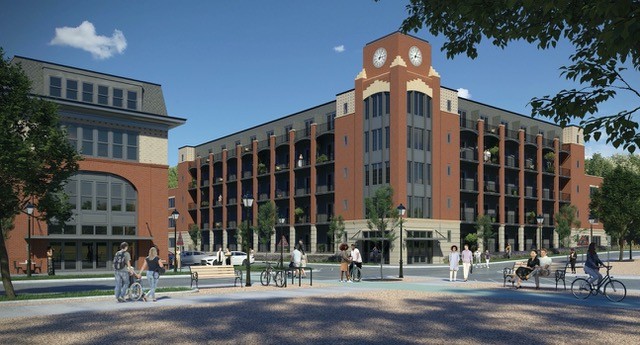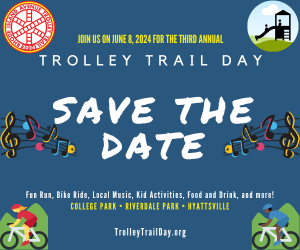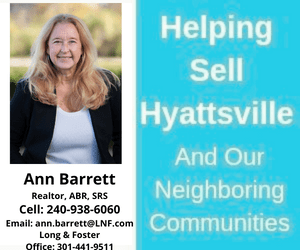BY HEATHER MARLÉNE ZADIG
Developers Werrlein Properties and Douglas Development were met with widespread skepticism Sept. 13 at a meeting to discuss The Lofts at Riverdale Park, a development proposed for the Riverdale Park Town Center. Neighbors and city officials expressed concerns over transparency, affordable housing and traffic impacts, among other issues. Though developers stressed that their plan is only conceptual, the proposed five-story main building and a smaller three-story building, if built, would include a total of 87 rental units, including studio and one- and two-bedroom apartments. (Werrlein is also currently building the Suffrage Point development in Hyattsville.)

Courtesy of Romero Architects/Bennett Frank McCarthy
Werrlein and Douglas organized the county-required meeting to discuss proposed zoning changes and preliminary plans for the two sites, both of which are owned by Douglas and located in the Riverdale Park Historic District. Riviera Tapas currently occupies a portion of the site, as do two historic properties: a house built circa 1900 and a vacant building that previously housed the Archie Edwards Blues Foundation.
The parcels currently have two different zoning designations, with the smaller parcel zoned as mixed-use and the larger parcel split between mixed-use and residential. The developers are seeking to have the combined area rezoned as a transit-oriented planned development zone that allows them to write their own rules for the site, including height, density of units and parking standards. The current zones for the sites were established in 2004, while the new transit-oriented zone was created by the county council in April 2022.
A 75-unit five-story apartment building with an underground parking garage is proposed for the larger parcel; the building would be reduced to three stories at the southern end “to be good neighbors” by limiting local impacts to light and view, said lead architect Michael Romero, who lives in Hyattsville. The large building would replace multiple buildings and a parking lot between Queensbury and Riverdale roads, along Rhode Island Avenue. An additional three-story building would have 12 units and would be located across the street, at Rhode Island Avenue and Queensbury Road along the railroad tracks.
The land planner for the project, Mark Ferguson — who also lives in Hyattsville — said during the meeting that even if zoning changes passed, the county council would have to evaluate those standards before they could be applied. According to the county website, Riverdale Park does not have jurisdiction over zoning decisions (the City of Laurel is the only municipality in the county that manages its own zoning).
Riverdale Park Councilmember Richard Smith (District 1) said he welcomed development of the neglected properties but expressed frustration at what he called a lack of outreach to the city on the part of developers, adding, “We haven’t had a great start with transparency.” Riverdale Park Mayor Alan Thompson added that there had been no known contact from developers about the proposed development site for more than a year. In an email exchange following the meeting, planner Ferguson emphasized that the county-mandated meeting was intended “to start the public conversation and gather information,” rather than to present a finished product.
Throughout the meeting, audience members expressed concerns about the project’s potential impacts, including on bike and pedestrian safety, housing costs, and what residents said were already-overcrowded schools. Speakers also raised issues related to the town’s character, citing construction noise and disruptions to Riverdale’s small-town, historic vibe.
Pete Spiropoulos, owner of nearby Town Center Market, spoke emphatically in support of the plan, however. “I’m tired of looking at empty, dirty buildings. I want to see something better,” he said.
Other community members expressed measured support for development, in general, citing potential benefits to area businesses, the need for more housing and the environmental value of transit-oriented development; however, they also expressed concerns about affordability and increased traffic. Ferguson said that traffic studies would be conducted only if the zoning change was approved.
After the meeting, when asked about traffic concerns, architect Romero said, “There can’t be an active center without traffic, and you can’t let that dictate development,” emphasizing that transit-oriented housing is intended to reduce vehicle miles traveled.
When pressed further, Romero said, “We’re counting on location, bike storage, type of units, and —” he paused to gather up his materials, “hoping that they won’t use their cars.”







